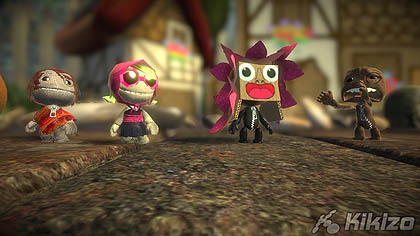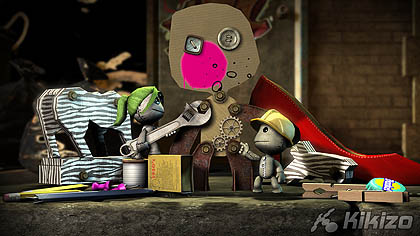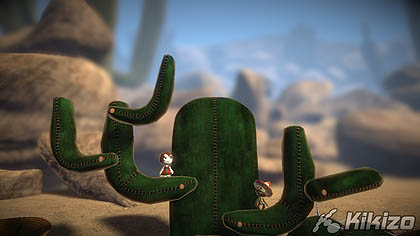LittleBigPlanet: The Very Big Interview
We talk to Media Molecule co-founders Mark Healey and Alex Evans, as well as Sony's Pete Smith, to get the FULL story behind the big PS3 game from a little British studio.
Page 3
Where the game really starts to show off its magic, though, is when you start sharing your hard work with other players around the world. And it's here where the biggest unknowns lie. Will players create the sort of levels that will keep the game popular? Will it be possible to sift through the endless crap and homage that will undoubtedly weigh down servers within days of launch?
From speaking with our three interviewees, it's clear that both Sony and Media Molecule have given this unique class of problems the sort of due diligence we have come to expect for a top-tier game. The ranking system is actually twofold, relying on both "hearting" and "fame". The former is a simple binary evaluation system that allows players to heart created content that appeals to them. The more "hearts" an in-game object gets, the better for its exposure on the various rankings that will be presented to players.
"We know there's going to be hundreds of thousands of levels. There's going to be masses of them. We know there's going to be some... not-very-good levels," says Pete Smith. "It's really important that people can weave their way through the not-so-desirable levels to find the desirable levels." Complementing the hearting system is another more personal one, one that will bring recognition to the creators of the best levels, objects and add-ons.
Tagging will play an important part in the object creation mechanism, too. Among the flags associated with an object is one that determines how it can be shared. If, for example, I mark my object as non-sharable, I can let you take a copy of it by putting it inside a bubble that you can interact with. Anyone who plays in your world and sees how cool it is, however, will have to come to me to get it.
Every created object will include information about its creator, allowing these hardworking people to make a name for themselves in the community by essentially forcing people to come to their world to get the objects. The result is that creators will get more direct recognition of their work through the fame system, something that is "almost more important than hearting", according to Smith.
If this tagging and hearting sounds a bit like YouTube you're on the right track. Smith acknowledges that there are "a lot of similarities" between them but insists that LittleBigPlanet takes the idea much further. For one thing, Media Molecule and Sony are looking for much higher participation rates than those seen on Google's video service. "The percentage of creators [on YouTube] is tiny," Smith says. "We hope because it's so easy to create that we'll up up with hopefully a larger proportion."








 Satoru Iwata Video Interview - the late Nintendo president spoke with Kikizo in 2004 as 'Nintendo Revolution' loomed.
Satoru Iwata Video Interview - the late Nintendo president spoke with Kikizo in 2004 as 'Nintendo Revolution' loomed. Kaz Hirai Video Interview - the first of Kikizo's interviews with the man who went on to become global head of Sony.
Kaz Hirai Video Interview - the first of Kikizo's interviews with the man who went on to become global head of Sony. Ed Fries Video Interview - one of Xbox's founders discusses an epic journey from Excel to Xbox.
Ed Fries Video Interview - one of Xbox's founders discusses an epic journey from Excel to Xbox. Yu Suzuki, the Kikizo Interview - we spend time with one of gaming's most revered creators.
Yu Suzuki, the Kikizo Interview - we spend time with one of gaming's most revered creators. Tetris - The Making of an Icon: Alexey Pajitnov and Henk Rogers reveal the fascinating story behind Tetris
Tetris - The Making of an Icon: Alexey Pajitnov and Henk Rogers reveal the fascinating story behind Tetris Rare founders, Chris and Tim Stamper - their only interview? Genuinely 'rare' sit down with founders of the legendary studio.
Rare founders, Chris and Tim Stamper - their only interview? Genuinely 'rare' sit down with founders of the legendary studio. The History of First-Person Shooters - a retrospective, from Maze War to Modern Warfare
The History of First-Person Shooters - a retrospective, from Maze War to Modern Warfare